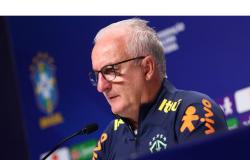Last Thursday (25), the I got sick (ENJU3), a second-hand clothing platform, opened its first physical store, in the Vila Madalena neighborhood, in São Paulo. The opening took place two weeks after the Kaboom, a technology product brand from Magalu (MGLU3), opens its first unit, also in the capital of São Paulo. The cases are not isolated, nor are they the first of traditionally digital commerce seeking its space on the streets. The subscription wine club winefor example, had already undertaken its work in 2019. Behind these moves, retailers seek to expand the addressable market, distribution capacity, connect with niche customers and gain in impulse sales.
Enjoei’s move is not unexpected. In December 2023, the company purchased 25% (with the right to acquire control) of Cresci e Perdi, a chain of 600 physical stores selling used children’s products already aiming to expand its presence in the physical world. After the opening of the first venture with the Enjoei brand on the facade, two new stores should open in 2024, to test the business model and expand with franchisees.
For the company, the move was natural given a growing and highly fragmented market for second-hand clothes in thrift stores. In 2022, the volume of sales in these projects grew 30% compared to 2021, according to research by the Gastão Vidigal Institute of Economics. “There was a time when we grew a lot in internet penetration. Now, the time is to try other channels”, says the CEO of Grupo Enjoei, Tiê Lima.
Continues after advertising
Furthermore, with physical stores, the idea is that customers can evaluate second-hand pieces and make the product they consume online tangible, increasing trust in the brand and in the brand’s e-commerce itself.
Visibility and retail capacity
The reason is similar to one that led KaBum to build its physical store. It is a unit of products open box, of parts purchased and, normally, returned within the warranty period. According to Bruno Chamas, head of marketing, there is still no projection for new units. “It’s an experiment, a step away from KaBum. Obviously, it doesn’t change our priority regarding online commerce, but it has the strategic factor of giving visibility to these products. Give more opportunities to the customer who wants to buy it.”
This first unit is on the second floor of a Magazine Luiza on Marginal Tietê, but operates separately. Today, products purchased through e-commerce can be picked up anywhere on the Magalu network, which guarantees the company better logistics capacity.
For businesses like Wine, physical units solve precisely this problem. The company opened its first store in 2019, in Belo Horizonte. Today there are 17. Even though the initial reading could lead one to think that the pandemic would harm the strategy, the opposite happened. From the beginning, the idea was to decentralize the stock through points on the streets. The company maintained the pace of network expansion during isolation because it was able to boost distribution to meet delivery orders.
“We wanted that when the club’s subscriber went to order a wine, they would do so through our e-commerce. But we only had one distribution center, in Serra, Espírito Santo, and we saw that customers wanted to receive deliveries faster”, explains Alexandre Magno, commercial vice-president of Grupo Wine. “They needed to receive the wine on the same day, because most do not plan to purchase it and do not have cellars at home to store the wine in a conditioned way”, he adds.
Wine and KaBum share the fact that they are commerce models consumed by niche customers. Whether it’s testing the weight and texture of mice, evaluating the performance of hardware or asking for recommendations and tasting wine, both companies see physical stores as a channel to allow consumers to come together. The two companies promote meetings and events to the public in physical stores and look for attendants qualified to recommend and explain technical details of the products.
Continues after advertising
“In-store purchases at Wine have an average ticket price of around 40% higher than purchases via delivery. We attribute this largely to the experience of having a salesperson explain it to the customer”, says Magno.
A global scenario
Although investments in digitalization during the pandemic and purchasing habits themselves have changed, physical commerce remains consumers’ favorite, according to research by PwC. According to the Global Consumer Insights Pulse Survey, 43% of consumers still prefer to shop in stores — next are cell phones, with 34%, and computers, with 23%.
“The tendency for native businesses in the digital world, called pure players, opening physical stores is global”, points out Alberto Serrentino, founder of Varese Retail. It turns out that the customer acquisition cost (CAC) in physical businesses is lower compared to the investments in media and traffic required in online commerce.
The post-pandemic also has an influence on this. With the increase in interest rates around the world at the end of the health emergency, digital platforms found their economic models under pressure. The balance between CAC and capturing these customers has become a fundamental equation, explains the expert.
“Many digital businesses need to find new ways to win customers and grow to keep them in balance”, he explains. “This is why e-commerce has grown little in the last two years. Companies started to look a lot at margins and profitability in online sales. Commercial aggressiveness, discounts and interest-free installments have decreased. All of this affects demand”, he adds.
Do you want to stay up to date with the main news that moves the business world? Sign up and receive new InfoMoney Business alerts by email.
Tags: Enjoei KaBum ecommerce platforms open stores physical world
--





